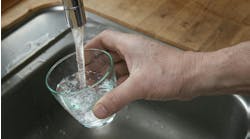ATLANTA – With HVAC&R systems accounting for approximately a third of water consumption in a typical office building, the need to minimize water usage is a major consideration in the built environment industry.
A standard to provide baseline requirements for the design of buildings, site and mechanical systems is being developed by ASHRAE, the American Society of Plumbing Engineers (ASPE), the American Water Works Association (AWWA) and the U.S. Green Building Council (USGBC).
ASHRAE/USGBC/ASPE/AWWA Standard 191P, Standard for the Efficient Use of Water in Building, Site and Mechanical Systems, is currently open for public comment from Oct. 26 until Dec. 10, 2012. To comment on the proposed standard or for more information, visit www.ashrae.org/publicreviews.
“Water efficiency and conservation is a critical factor in the design and operation of buildings,” John Swift, chair of the committee writing the standard, said. “Buildings consume 20 percent of the world’s available water, a resource that becomes scarcer each year. Efficient practices and products provide opportunities to save significant amounts of water. The reduction of energy use and operating costs and the expectation of increased government regulation will continue to drive faster adoption of water-efficient products and methods.”
The requirements in the standard would optimize the volume of water required to operate HVAC systems, plumbing systems and irrigation systems. There is currently no standard document that adequately and comprehensively addresses the issue of how to efficiently use water in the design, construction and operation of buildings, according to Swift.
The proposed standard covers HVAC&R and non-HVAC&R systems including: evaporative heat rejection, humidification systems, thermal storage, ground source pump systems, water heating systems, laboratory facilities and residential appliances. It would not apply to storm water management.
The standard will provide the tools that a design team needs to properly apply water efficiency measures on all aspects of a building design and construction project. In order to optimize water efficiency in buildings, plumbing, fire protection and HVAC&R engineers must work closely with civil engineers and landscape architects in putting together a functional building mechanical system.
Latest from Green
Latest from Green
Voice your opinion!
Voice your opinion!
To join the conversation, and become an exclusive member of Contractor, create an account today!
Sponsored Recommendations
Sponsored Recommendations

